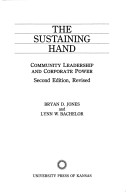As the recent shake-up at GM underscores, the new global economy has widened the cracks and stresses in the American auto industry. But, as this new edition of the highly regarded Sustaining Hand reminds us, the auto industry remains a central if volatile player in American urban politics.In this significantly revised update, Bryan Jones and Lynn Bachelor have extended and refined their analysis of Detroit-area automakers and political leaders negotiating the selection of new factory sites (and thus the addition of thousands of jobs to the local economy). Their thorough revision develops a crucial new concept--solution sets--updates all plant location decisions reported in the first edition, and adds an instructive new case study--the Chrysler Jefferson Avenue plant in Detroit.
This book seeks to uncover the linkages between business leaders(motivated by profit) and political decision makers (motivated by electoral gain) by examining the responses of public officials in three Michigan "auto cities"--Detroit, Flint, and Pontiac--to plant-location choices made by General Motors and Chrysler. Throughout, the authors focus on three issues-the relationship between the local industrial economy and the local political system, the structure of urban politics, and the degree of independence of political decision makers in urban affairs.
As Jones and Bachelor show, urban regimes, in their efforts to shore up sagging economies, develop characteristic solution-sets that are applied almost routinely to superficially similar situations. In fact, they contend, it's rare for a regime to start with a problem and search for a policy solution. Instead, through a pattern of interactions among politicians, business executives, labor unions, and other interested parties, a "package" of problem-definitions and preferred solutions emerges. But if applied indiscriminately, these solutions can become dysfunctional, which in turn may attract new participants to the policy process and ultimately alter the regime's character.
"An excellent case analysis of urban political economy. . . interesting, sophisticated, well written. It is sure to be widely discussed."--Clarence N. Stone, author of Urban Policy and Politics in a Bureaucratic Age and Economic Growth and Neighborhood Discontent.
"This new version makes significant new contributions to both the urban politics and public policy literatures, and indeed marries them in an utterly unique way. The concept of solution sets is brilliant, and I assume that it will be much discussed and utilized in the urban literature."--Dennis Judd, author of The Politics of American Cities: Private Power and Public Policy.
Praise for the first edition:
"An excellent book. The authors demonstrate a considerable capacity for theoretical innovation and a rare appreciation of the detail and complexity of local economic development. This book is a model for those who would like to situate the local economic development process in a more general analytical framework."--Urban Studies
"A provocative addition to the literature"--Choice
- ISBN10 0700605983
- ISBN13 9780700605989
- Publish Date 1 January 1993 (first published 1 January 1986)
- Publish Status Out of Print
- Out of Print 25 November 2013
- Publish Country US
- Imprint University Press of Kansas
- Edition 2nd Revised edition
- Format Hardcover
- Pages 270
- Language English
